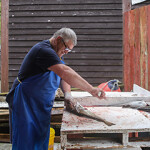Change of clothing every hour: Chilean fisheries confront COVID-19

As the number of confirmed COVID-19 cases in Chile rises, the country’s seafood industry is working to manage the spread of the virus.
“The COVID-19 pandemic puts us all to the test: people, industries, and governments. We can clearly say that the companies that belong to the association are taking all the measures needed to prevent contagion,” Arturo Clement, president of Chile’s salmon industry association, SalmonChile, said in his Twitter feed. “As an industry, we have increased prevention measures to keep our workers safe.”
SalmonChile includes as members most of the 47 main producers and supply companies of Atlantic salmon, coho salmon, and trout in Chile. SalmonChile has reported the industry is undertaking a number of special actions to prevent the spread of COVID-19, including sanitizing bathrooms, hallways, cafeterias, means of transport, and infrastructure, with alcohol gel being made available at strategic points. Lunch shifts have been modified to bring groupings of people to a minimum at each facility, encouraging social distancing between workers. Bag lunches are also being made available to make sure human contact is avoided as much as possible. Entry and exit times of work schedules have also been tiered to avoid gatherings of large groups of people, while commute protocols have been established to minimize contact between workers at the facilities.
Preventative health control measures have also been implemented, including taking the temperatures of workers and other health monitoring protocols. Salmon farmer Blumar said on its website it has been reinforcing work teams with health professionals, taking the temperature of all workers and visitors that enter its facilities. The company has also executed an internal communications awareness campaign, a toll-free hotline for questions and follow-up of suspected cases, as well as travel and meetings restrictions.
Responding to SalmonChile’s call, a number of companies confirmed that workers with a record of chronic illness, senior citizens, pregnant women, and mothers with children younger than two years of age have all been sent home without having their pay-to-date docked.
Meanwhile, the industry association outlined other measures that are not so conventional.
“We have established a protocol that requires the changing of work clothes every hour,” Clement said on Twitter. “While our workers are used to the highest standards of sterilization and sanitation, this measure will serve to increase preventative efforts.”
Mowi Chile, in turn, has implemented longer shifts at its farming centers, with its workers now working 14 days straight and then receiving 14 days off, with private ground, water, and air transport to transfer those workers to and from the centers so as to avoid areas of contagion, Fernando Villarroel, the company’s general manager, told newspaper Diario Financiero. A full 65 percent of Mowi Chile’s employees are teleworking, and that number is set to rise, he added.
In terms of workers that physically need to be at the facilities, salmon farms and their employees are exempt from the curfew that was declared as part of the emergency measures on 18 March by Chilean President Sebastian Piñera, which prohibits circulation between 10 p.m. and 5 a.m. According to Chile’s Sub-Secretary of Fisheries and Aquaculture (Subpesca), the restrictions must be compatible with a fundamental need of guaranteeing the availability of the country's food supply
"It is essential that fishing and aquaculture plants continue to work in order to ensure the supply chain, but safeguarding the health and well-being of their workers, through strict compliance with the health recommendations provided by the authorities,” Subpesca said. Safe conduct permits may be issued by the national police force ... for fishery workers.
Over the weekend, the National Confederation of Salmon and Mytilidae Workers (Conatrasal) sent a letter to Piñera, Clement, and the minister of health proposing a complete halt to the business in general; with the aim of "safeguarding the lives of all the people who work in this field and their families," publication BioBio Chile reported.
However, considering all of the safety measures being put in place, Clement said that fully closing operations would be an “overreaction.”Clement said the industry’s plans to lower production while decreasing the presence of humans at different levels of operation, ensuring the execution of basic operations for the health care of the fish and the industry overall, will be a sufficient response to the coronavirus.
“We can avoid seeing our communities affected by an environmental crisis due to the death of fish from the total closure of the plants,” he said on Twitter.
Photo courtesy of AquaChile





Share